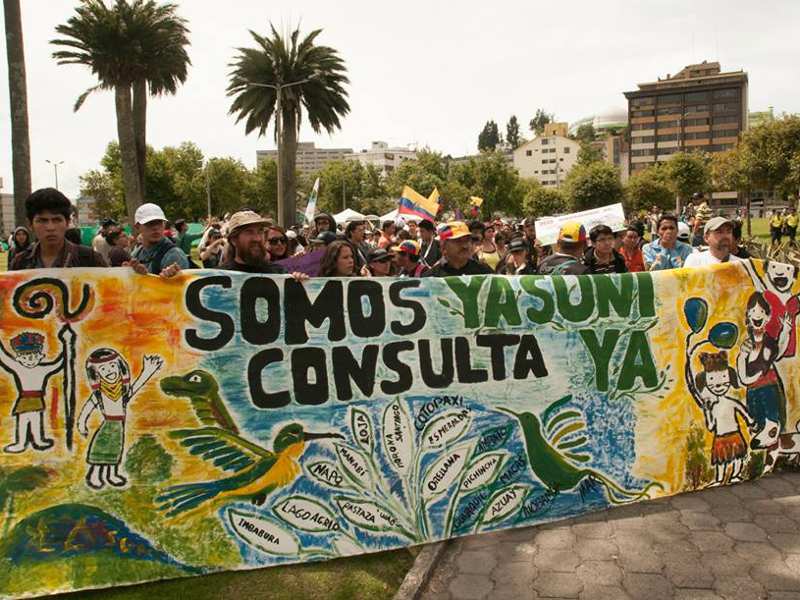Ecuador stands to lose more than $16 billion in income over the next 20 years if the Yasunidos proposal to stop crude oil production in Yasuni National Park is approved.
Petroecuador’s disclosure of financial information marked the start of an information campaign aimed at ensuring that the public comprehends the economic ramifications of ceasing crude oil production in the ITT block (i.e., the Yasunidos proposal), located near Yasuni National Park.
The company’s event held on May 25th featured special guests, including representatives from Waorani and Kichwa communities residing in the vicinity. These community leaders expressed their opposition to the Yasunidos proposal and emphasized their desire for continued oil exploration in the area.
Considering a potential negative outcome for the industry, Energy Minister Fernando Santos Alvite acknowledged that efforts have been made to engage Ambassador Ivonne Baki in seeking to reactivate international aid that was lost a decade ago when the Yasuni ITT initiative fell through.
The costs for Ecuador
According to Petroecuador’s manager, Ramón Correa, approximately $16.47 billion would not be received by Petroecuador and the State over the next 20 years if the initiative to leave the ITT crude in the ground secures the majority vote in the upcoming popular consultation scheduled for August, alongside the presidential and assembly members’ elections.
Correa presented a breakdown of the potential costs associated with abandoning the field, including expenditures for well closure, plugging, and environmental remediation, estimated at a minimum of $467 million. Loss of employment and social compensation over two decades is projected to reach $251 million. Furthermore, investments made by 2023 that would no longer yield returns amount to $1.952 billion. The non-production of the ITT block would result in a loss of $13.8 billion.
Highlighting the significance of the ITT block, Correa referred to it as “our jewel” and affirmed the company’s commitment to environmental preservation throughout the years. He elaborated that the ITT block, known as Ishpingo-Tambococha-Tiputini, is currently being developed within an area of just 80 hectares, following a reduction from 1,000 to 300 hectares based on the previous consultation.
The operation’s cost, including investment, stands at $15.31 per barrel, with 50 companies involved in the project. Since 2014, the net value obtained from ITT has reached $4.0 billion.
Other indigenous against Yasunidos proposal
Indigenous leaders from the ITT region, often referred to as “the homeowners,” also expressed their position. Enkemo Kehuanto Gabamo, the leader of the Waorani community of Kawymeno, voiced concerns regarding the NGO’s proposal and Yasunidos. He stressed that the community desires the continuation of oil activities for the sake of their children and grandchildren. Gabamo mentioned that Yasunidos had not engaged with them on the matter, and if the oil company were to leave the area, they would lose various benefits such as access to healthcare and employment opportunities. His call for work resonated with the audience, eliciting applause and chants of “Yasunidos has no say.”
Similarly, Marco Gomel Grefa Condo, president of the Boca Tiputini Kichwa community, emphasized the social and economic assistance provided by Petroecuador. The community, he stated, does not wish for the oil to remain untapped but rather to be exploited. Grefa attributed the benefits of education, transportation, and employment opportunities to oil activities.
Minister Fernando Santos acknowledged the concerns expressed by the inhabitants of the ITT area, who fear losing their livelihoods if the “Yes” vote prevails. He noted that approximately 1,000 workers from the region would be left in dire circumstances without a viable alternative to oil production.
Few options to replace income
Santos also expressed frustration at the difficulty of replacing the resources that would no longer be obtained if crude oil production were halted. He emphasized that humanity would not gain anything by Ecuador ceasing its oil pumping since another oil-producing country would capitalize on the demand. He pleaded with Yasunidos to show compassion for the people living in the area.
Addressing questions regarding the quality of the crude oil extracted from ITT and the possibility of reactivating initiatives like the failed Yasuni ITT proposal, the minister clarified that the Tambococha and Tiputini fields produce commercial-grade crude. He acknowledged the heaviness of the crude in the Ishpingo field, suggesting its closure might be less problematic.
Regarding the potential for renewed international support, Minister Santos revealed that he and Minister Roberto Salas had engaged in discussions with the United States ambassador, Ivonne Baki, who spearheaded the initial initiative. They explored the possibility of reactivating international aid, given the sacrifices Ecuador would have to make.
Santos acknowledged the challenges involved in reigniting interest since the issue had lost momentum but expressed the intention to try. He recalled the previous widespread interest among potential donors, who had pledged around $4.0 billion. However, the initiative failed due to the donors’ request for transparency in the allocation of funds, while President Rafael Correa resisted the need for accountability.


There should no be any expenses for “environmental remediation,” since they should be using techniques that do not damage the environment for the oil exploitation. The referendum will not be on the ballot. From what the article says, the oil fields are not in the Yasuni proper, but near. Could you clarify this?